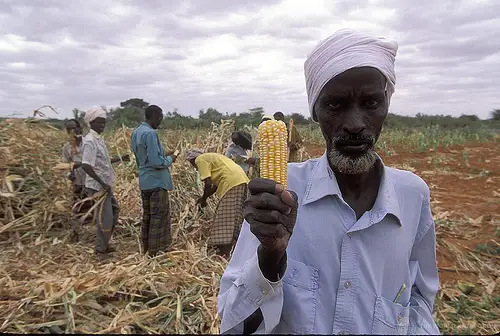What we can learn from farmers about ICT4D and trust
There is often that notion that once you have access to the Internet or to other information and communication technologies (ICT), the whole world of information lies rights at your feet, so you only need to pick the best of it. But in contrary, it can become incredibly time consuming to verify information and to make yourself a trusted source. In the field of ICT4D, this issue is particularly important. In many cases people do not have years of experience working with ICTs and have actually learnt them just the auto-didactic way – using the Internet for their own benefit. Let's take the case of farmers in rural areas of Africa.
Farmers in developing countries
The other day I had an interesting conversation with a colleague, who has been working already for decades in the rural development and agriculture field around the world. We talked about the potentials for ICT in agriculture and in specific farmers. One of the major challenges is neither access nor literacy, but simply trust. Why should a farmer trust an information coming from somewhere as an SMS? Farmers make careful elaborations, before they change certain practices. Information from a website can help, but at the end of the day what counts is the advice of trusted colleagues. So, we have to realize that information through ICTs often have only a small impact.
ICT and agriculture
In the case of agriculture, behavioural change through extension advice is even more difficult to happen through ICTs. For decades, it has been well known that advise has no effect if simply some guides and brochures are sent to farmers. More effective is a participatory process, where farmers learn from each other directly. So why should farmers change practices they have done for years when they get advice through SMS or any other channel? "It needs a lot more than ICTs," pointed my colleague.
In contrast, market information particularly through mobile phones is more successful because of the price information, which are much easier to trust than a particular advice for the next cultivation. But even in this case, they had to be introduced in groups of trusted people. Otherwise, who would trust a SMS from anywhere? Would you? There have been cases where rumors spread through SMS have even led to violence.
Demystify the Internet in Rural Africa
Take yourself as an example, how many sources do you really read or how many people do you speak to before you can take the information for granted? ICTs allow for incredibly easy publishing and disseminating of information; but the information is still not worth a penny if it is not trusted. Linda Raftree has a great post, where she describes her experiences during ICT training courses in Ghana.
“Another question that surfaced was ‘Is the internet true?’" This led to a great discussion on how information comes from all sides, and that anyone can actually put information online. It’s truth, and anyone can’t believe everything one reads, it’s not regulated, you need to find a few sources and make some judgment calls."
Although all this information is not new at all, so many ICT approaches forgot exactly about that challenge. The information has to only be delivered somewhere and that should bring change. The problem is that trust is built slowly through social relations and these take a lot longer to grow online.
